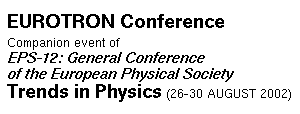 |
 |
 |
Despite the poor economic situation in most of the Latin American countries, there was important scientific activity in the region during the last century. Some examples, extracted from those countries, show that physics is not restricted to wealthy countries.
The first physics research activity in Latin America dates from the late 1940s. With the exception of some experiments on cosmic radiation, early physics research was almost completely theoretical. Along with a well organized scientific activity, undergraduate programs in physics first appeared in the 1940s and graduate programs only in the 1950s. After sixty years of continuous education, in general, the number of physicists is still too small to contribute significantly to the economic development of this large region. Exceptions are Brazil, Mexico, and Argentina, countries that have an important number of physicists that started to contribute to achieve better economic standards. In these countries, there is a growing interest at some universities and research centers to establish bridges with industry.
The first research groups worked mainly in theoretical physics, including cosmic radiation, gravitation, and nuclear, atomic, and high energy physics. Research in optics, statistical physics, and solid state physics developed in the 1970s. Nowadays the most active field of research is materials science. Most of the contributions meet the highest international standards.
One can conclude that the precarious economic development in Latin American countries in the past century did not hinder the implementation of educational programs in physics and the creation of important research groups.
The following files are available:
- abstractmoran.pdf [8899 bytes]
- abstractmoran.doc [43520 bytes]
Eurotron Conference is supported by European Commission, High-Level Scientific Conferences